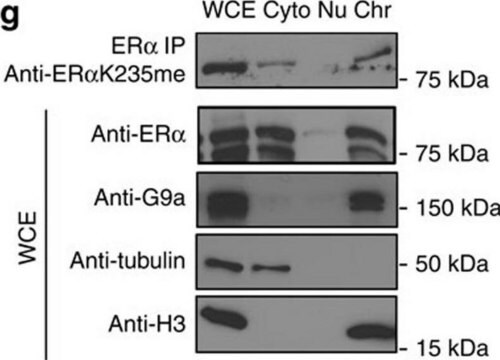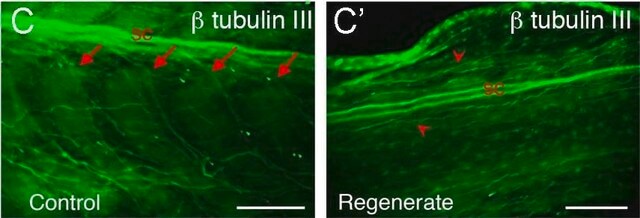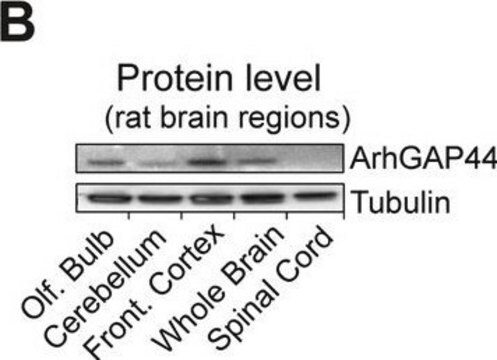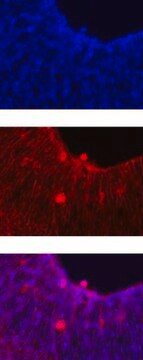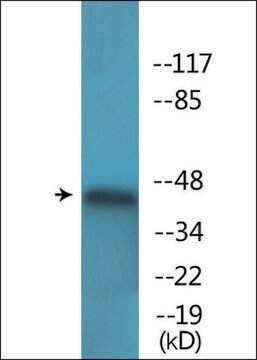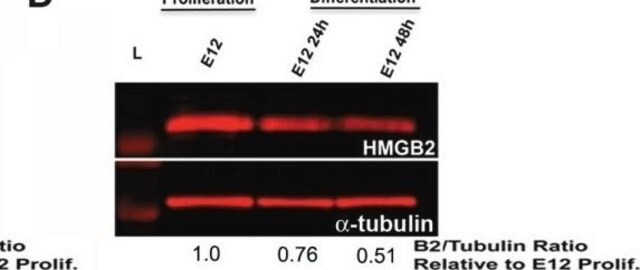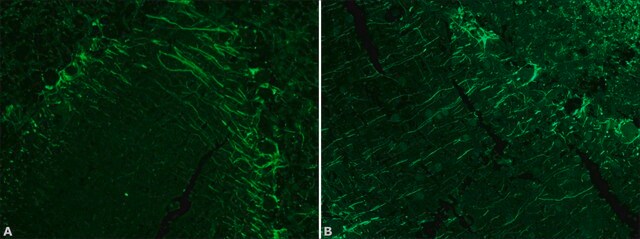SAB4700544
Monoclonal Anti-TUBB3 antibody produced in mouse
clone TU-20, purified immunoglobulin, buffered aqueous solution
Sinônimo(s):
Anti-βIII-tubulin
Faça loginpara ver os preços organizacionais e de contrato
About This Item
Código UNSPSC:
12352203
NACRES:
NA.41
Produtos recomendados
fonte biológica
mouse
Nível de qualidade
conjugado
unconjugated
forma do anticorpo
purified immunoglobulin
tipo de produto de anticorpo
primary antibodies
clone
TU-20, monoclonal
Formulário
buffered aqueous solution
reatividade de espécies
wide range
concentração
1 mg/mL
técnica(s)
western blot: suitable
Isotipo
IgG1
nº de adesão NCBI
Condições de expedição
wet ice
temperatura de armazenamento
2-8°C
modificação pós-traducional do alvo
unmodified
Informações sobre genes
human ... TUBB3(10381)
Categorias relacionadas
Descrição geral
The antibody TU-20 recognizes C-terminal peptide sequence ESESQGPK (aa 441-448) of neuron-specific human betaIII-tubulin.
Tubulin β 3 class III (TUBB3) also known as β-tubulin III, is encoded by the gene mapped to human chromosome 16q24.3. TUBB3 protein expression is restricted to neurons.
Imunogênio
Peptide (C) 441-448 coupled to maleimide-activated keyhole limpet hemocyanin via cysteine added to the N-terminus of the neuron-specific peptide
Aplicação
Applications in which this antibody has been used successfully, and the associated peer-reviewed papers, are given below.
Western Blotting (1 paper)
Western Blotting (1 paper)
Monoclonal Anti-TUBB3 antibody produced in mouse has been used in immunocytochemistry.
Suggested working dilution for immunoblotting is 1-2 μg/mL of sample. Indicated dilution is recommended starting point for use of this product. Working concentrations should be determined by the investigator.
Ações bioquímicas/fisiológicas
Tubulin β 3 class III (TUBB3) plays a vital role in nervous system development and axon guidance. Mutation of the gene encoding protein leads to the ocular motility disorder, congenital fibrosis of the extraocular muscle type 3 (CFEOM3), and various neurological syndromes. Altered expression of the protein affects microtubule dynamics and microtubule-kinesin interactions. Increased expression of TUBB3 is observed in tumor tissues. Decreased expression of TUBB3 can be considered as an important marker for poor prognosis of cutaneous malignant melanoma. TUBB3 is implicated in the suppression of invasive growth of tumor tissue. Thus, it is considered to be a potential target for development of antitumor drugs.
Características e benefícios
Evaluate our antibodies with complete peace of mind. If the antibody does not perform in your application, we will issue a full credit or replacement antibody. Learn more.
forma física
Solution in phosphate buffered saline, pH 7.4, with 15 mM sodium azide.
Exoneração de responsabilidade
Unless otherwise stated in our catalog or other company documentation accompanying the product(s), our products are intended for research use only and are not to be used for any other purpose, which includes but is not limited to, unauthorized commercial uses, in vitro diagnostic uses, ex vivo or in vivo therapeutic uses or any type of consumption or application to humans or animals.
Não está encontrando o produto certo?
Experimente o nosso Ferramenta de seleção de produtos.
Código de classe de armazenamento
10 - Combustible liquids
Ponto de fulgor (°F)
Not applicable
Ponto de fulgor (°C)
Not applicable
Escolha uma das versões mais recentes:
Já possui este produto?
Encontre a documentação dos produtos que você adquiriu recentemente na biblioteca de documentos.
Angelo Torres et al.
Oncotarget, 7(41), 67373-67386 (2016-09-17)
MRP1 transporter correlates positively with glioma malignancy and the Multiple Drug Resistance (MDR) phenotype in Glioblastoma Multiforme (GBM). Evidence shows that the MRP1 transporter is controlled by the adenosine signalling axis. The aim of this study was to identify the
Meghan Hauser et al.
Cell reports, 24(6), 1512-1522 (2018-08-09)
Through three-dimensional STORM super-resolution microscopy, we resolve the spectrin-actin-based membrane cytoskeleton of neural stem cells (NSCs) and NSC-derived neurons, astrocytes, and oligodendrocytes. We show that undifferentiated NSCs are capable of forming patches of locally periodic, one-dimensional (1D) membrane cytoskeleton with
Adenosine A3 receptor elicits chemoresistance mediated by multiple resistance-associated protein-1 in human glioblastoma stem-like cells.
Torres A
Oncotarget, 7, 67373-67386 (2016)
Tumoral and tissue-specific expression of the major human beta-tubulin isotypes.
Leandro-Garcia LJ
Cytoskeleton (Hoboken, N.J.), 67, 214-223 (2010)
BETA-III TUBULIN AS A POTENTIAL TARGET FOR BLOCKING INVASIVE GROWTH OF MALIGNANT EPITHELIAL TUMORS
Portyanko AS
Eksperimental'naia i Klinicheskaia Farmakologiia, 78, 25-28 (2015)
Nossa equipe de cientistas tem experiência em todas as áreas de pesquisa, incluindo Life Sciences, ciência de materiais, síntese química, cromatografia, química analítica e muitas outras.
Entre em contato com a assistência técnica